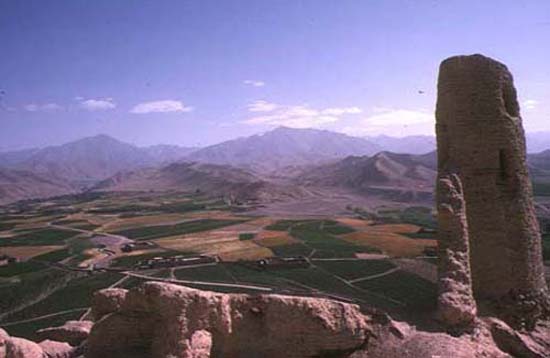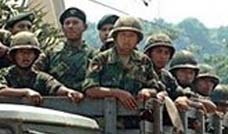
From Washington, Rashid echoes the critique of many Bush-era insiders: that a largely disengaged George W. Bush wound up following the "messianic vision'' of his neo-conservative Vice President Dick Cheney and Defense Secretary Donald Rumsfeld. They tried to use "American military power to reshape the world according to their own interests.'' From Asia, Rashid explains how the neocons made nicely gullible partners for Pakistan's military leader, then-President Pervez Musharraf, and his Inter-Services Intelligence Directorate (ISI). He musters ample anecdotal evidence that at least part of ISI plays a double game, helping the U.S. strike (mainly Arab) al-Qaeda while supporting Pakistani and Afghan jihadists such as the Taliban. This is an old strategy for Pakistan's army, which uses jihadist guerrillas to oppose liberal democrats at home and to fight India in the disputed territory of Kashmir, Rashid writes. ISI's Taliban handlers are waiting for America to give up in Afghanistan, leaving the Taliban to again form a pro-Pakistani, anti-Indian government there. Even as U.S. and NATO military officers gathered evidence of "a systematic and pervasive system of ISI collusion'' with the Taliban, the Bush administration declined to push Musharraf on the issue, Rashid writes. Journalist James Rupert, head of Newsday's international bureau in Islamabad, Pakistan began his career abroad as a Peace Corps volunteer, teaching mechanics and welding in Morocco.
James Rupert writes: Former Guerrilla Says Bush Is Bungling War in Afghanistan
Former Guerrilla Says Bush Is Bungling War in Afghanistan: Book
Review by James Rupert
Enlarge Image/Details
Sept. 12 (Bloomberg) -- In four months, a new U.S. president will inherit the foreign-policy train wrecks from the Bush administration's response to Sept. 11, 2001. And not just Iraq.
Ahmed Rashid explains the broadest of those disasters -- the jihadist insurgencies spreading in Afghanistan, Pakistan and Central Asia. His book "Descent Into Chaos'' should be read now by the McCain and Obama foreign policy teams -- and by anyone pondering how America might stop widening Osama bin Laden's pool of bomb-clad volunteers.
Rashid, a Pakistani journalist, is that most valuable of political analysts: both insider and outsider to the problem he studies. An army officer's son who grew up in Lahore and London, he studied political science through a Western lens at Cambridge in the 1960s. Amid the student radicalism of 1968, he dived into Asian politics and war, fighting and organizing for several years among separatist guerrillas in Pakistan's Baluchistan province.
For four decades, Rashid has absorbed his facts in guerrilla bunkers, military bases and presidential offices from the Silk Route to the Beltway, writing prescient books on Central and South Asia's slide into turmoil. He got little attention in the West until Sept. 11 transformed the Taliban movement into an American obsession, vaulting his 2000 book, "Taliban,'' to the top of the New York Times best-seller list.
Two Perspectives
From Washington, Rashid echoes the critique of many Bush-era insiders: that a largely disengaged George W. Bush wound up following the "messianic vision'' of his neo-conservative Vice President Dick Cheney and Defense Secretary Donald Rumsfeld. They tried to use "American military power to reshape the world according to their own interests.''
From Asia, Rashid explains how the neocons made nicely gullible partners for Pakistan's military leader, then-President Pervez Musharraf, and his Inter-Services Intelligence Directorate (ISI). He musters ample anecdotal evidence that at least part of ISI plays a double game, helping the U.S. strike (mainly Arab) al-Qaeda while supporting Pakistani and Afghan jihadists such as the Taliban.
This is an old strategy for Pakistan's army, which uses jihadist guerrillas to oppose liberal democrats at home and to fight India in the disputed territory of Kashmir, Rashid writes. ISI's Taliban handlers are waiting for America to give up in Afghanistan, leaving the Taliban to again form a pro-Pakistani, anti-Indian government there.
Even as U.S. and NATO military officers gathered evidence of "a systematic and pervasive system of ISI collusion'' with the Taliban, the Bush administration declined to push Musharraf on the issue, Rashid writes.
Axis of Instability
The Bush administration's support for Musharraf, until his fall from office last month, set back Pakistanis' hopes for democratization, reduced corruption and eventual political stability, Rashid says. The same is dangerously true, but less publicized, in Uzbekistan, where Washington courted ex-Soviet apparatchik Islam Karimov, who brutally rules 28 million people. For Rashid, these two countries, and Afghanistan between, form the axis of instability that menaces the world.
Since the Bush team overthrew the Taliban as a kind of warm- up exercise for its main act -- seizing control of Iraq -- it cared little whether Afghanistan would really be stabilized, according to Rashid. For years, it tried to buy security on the cheap by hiring corrupt warlords to control the provinces. That undercut the formal Afghan government under President Hamid Karzai, which has never recovered.
Marshall Plan
Rashid prescribes only general directions for Obama or McCain. Bush's successor should form a "global compact among the leading players -- the U.S., the European Union, NATO and the UN'' -- to help solve a morass of interlocking problems.
Focused diplomacy on the Kashmir dispute (never tried by Washington) is needed to settle that conflict, which fuels Pakistan's jihadism. The U.S. must make democratization a pillar of its policies in Pakistan and Uzbekistan. And a Marshall Plan of foreign aid is needed, particularly to begin bringing education and development to the isolated, violent core of the crisis -- the ethnic Pashtun lands of the Afghan-Pakistani border.
It all sounds like what President John F. Kennedy, deep in the Cold War, called "a long, twilight struggle, year in, year out.'' Rashid and many in the region say there is no other way.
"Descent Into Chaos: The United States and the Failure of Nation Building in Pakistan, Afghanistan and Central Asia'' is published by Viking (484 pages, $27.95)
(James Rupert is a Bloomberg News reporter in Islamabad, Pakistan. The opinions expressed are his own.)
To contact the writer of this story: James Rupert in Islamabad at jrupert3@bloomberg.net.












